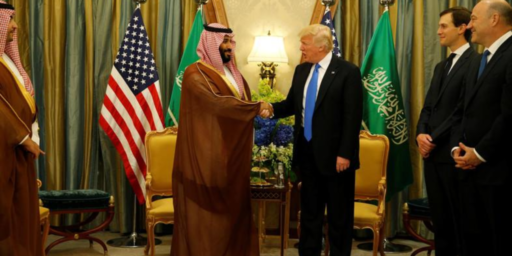TERRORISM AND IRAQ
Reacting to a Mark Steyn piece, Kathy Kinsley makes an interesting point about the upcoming 2nd anniversary of 9/11:
I truly think there’s a serious ‘cultural disconnect’ between the people who saw that day as an act of war and those who saw it as a horrific crime. We have such different worldviews that it is almost as though we actually do live in different worlds. That’s why some of us can say, quite sincerely, “of course Iraq is part of the war” and others can say, just as sincerely, that Iraq is distracting us from the ‘war’. To them, Osama is a criminal and we are dealing just with him and his cohorts. To the rest of us, the war is as far-reaching as the Cold War. We see an ideology at war with everything we hold dear. We do understand the root causes of why we were attacked and we are out to eliminate those causes.
I have a rather mixed view on this. On the one hand, I agree that we’re in a global war against radical Islam, of which al Qaeda is but one manifestation. I also came to the reluctant conclusion that it was worth war to topple Saddam’s regime.
I don’t, however, think Saddam was more than tangentially related to the GWOT. His regime was brutal but secular and largely non-ideological. Indeed, the radical Islamicists, whether al Qaeda or his own Shi’a, had little use for Saddam. Saddam clearly wished America harm and was in sympathy with terror groups who shared that goal; he apparently even helped them out a bit–although not as much as the Saudis and Iranians.
So, I view the Iraq war as part of the same larger goal as the GWOT–making the world safer for American values and interests–but also believe it strains resources that could otherwise be used to go after al Qaeda and other terror groups.






But the radical Islamists cannot ignore America sitting astride Iraq. If the do not directly challenge US forces there, they lose.
But if they do attempt to challenge America there, they die.
Hence, the “flypaper strategy.” I was skeptical of it at first, but it is making more sense to me now.
On a related topic;
http://nytimes.com/2003/09/07/opinion/07DOWD.html
Maureen Dowd has become a parody of herself.
I think that there is something to the crime v. war dichotomy in looking at terrorism writ large. Clearly, for example, the Clinton administration viewed the issue as a criminal justice problem primarily, for example. (This isn’t Clinton-bashing–it is just a fact. Look at the way the admin dealt with the first WTC bombing.)
—